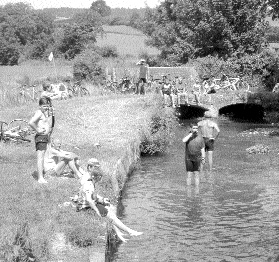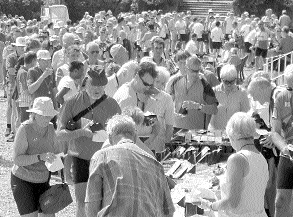FIRST PUBLISHED August 2003
Party Politics & Transport, Cyclist Touring Club in Dorset
Whatever became of politics? In the dim and distant past, politicians came in two shades: Labour, representing muck & brass whippet-owners from the North, and the Tories, a political party that appealed largely to elderly spinsters, cads, spivs and other other seedier types from the South.
You knew where you were in those days – Labour drew inspiration from the Soviet empire, offering equality, reform, and long queues for bath plugs, while the Tories stood on a broadly US-capitalist ticket, plus hanging and birching, but not necessarily in that order. You wouldn’t want to take any of them home to mother, but by and large what you saw was what you got. ‘Honest’ might be stretching a point, but most were at least politicians by conviction.
Labour spent a great deal of time and energy putting everything into national ownership, and the Tories took it out again. A wasteful, pointless exercise to be sure, but it was the British way.
If, for example, British Rail delivered a mouldy sandwich, you’d be minded to vote Tory at the next election, and deliver the anecdote to all your chums at the Red Lion. If you waited 30 minutes for a bus and three competing services came at once, you’d switch your allegiance to Labour. For tens, nay hundreds, of years, the public houses of Britain reverberated to such debate:Would private capital deliver a better sandwich? Would state control make the buses run on time?
Today, the spivs and whippets have been largely superseded by an amorphous mass of two-car, three-bedroom types from Bournemouth to Wigan. And with the collapse of the Soviet Union, the wind has rather gone out of the collectivist sails, leaving mass culture based broadly at the hang ’em, flog ‘em end of the spectrum.
With the electorate reduced to a sort of grey cultural pudding, the political parties have done their best to follow suit, vying with each other to introduce policies least likely to offend the three-bedroom types.Thus, Party A (labels are no longer of any consequence) privatizes the railways and the buses (load off the public purse, lower taxes, etc), while Party B gives vital railway assets to a privately-run cycle-path charity (load off the public purse, lower taxes, etc), Party A proposes a network of toll-motorways – bit dodgier this one, because the Ford-owning classes might realise they’ll have to pay-to-drive – but Party B gives the green light. Party A opts for road construction, then backs off, but Party B makes a big fanfare of returning to business as usual.
And so it goes on. In the absence of meaningful policy, the two-car, three-bedroomed types have become masters of the political process. As one might expect, we now live in a world of drive-thru hamburger restaurants, Virgin rail services (who chose that one?) and multi-terminal international airports flying millions of proles to sun-kissed Spanish beaches.
But in the rush to find policies to satisfy the majority, we’ve lost touch with the fact that some of these policies are actually bonkers. The privatised rail network costs more than the old nationally-owned one, yet runs slower and less reliably. Free-for-all buses add to congestion, yet reduce bus usage. Road construction has increased the demand for road space, resulting in more congestion, more road construction, and so on. Our transport system has become a real-time experiment for the dome-head fruitcakes political parties normally keep well under wraps.
 Take the railways, for example. Party A franchises services to a shambolic collection of bus companies, French mineral water magnates, and get-rich- quick operatives, handing the infrastructure to privately-owned Railtrack, which boasts that rail hardware will last 100 years, and concentrates on building profitable retail outlets instead. Within ten years, the network falls apart, sending Railtrack spinning into a black hole.Yet somehow, this raises barely a murmer, because no politician is willing to admit that whole process was fundamentally flawed.
Take the railways, for example. Party A franchises services to a shambolic collection of bus companies, French mineral water magnates, and get-rich- quick operatives, handing the infrastructure to privately-owned Railtrack, which boasts that rail hardware will last 100 years, and concentrates on building profitable retail outlets instead. Within ten years, the network falls apart, sending Railtrack spinning into a black hole.Yet somehow, this raises barely a murmer, because no politician is willing to admit that whole process was fundamentally flawed.
Of 25 rail franchises, no fewer than eight are currently under what are euphemistically termed ‘management contracts’. This means the franchises have failed, and should really be handed back into state control, but that would send the wrong message to the electorate, so it can’t be done. Crooked, incompetent or plain daft franchisees can do pretty much whatever they wish.
As the graph demonstrates, reliability has fallen sharply under private ownership, and may take another nine years to return to British Rail levels. At the same time, costs have escalated out of control. According to rail expert Roger Ford, public support (subsidy, investment, call it what you will) for British Rail amounted to a very reasonable £980 million in 1989-90, at 2003 prices. In 2003-04, the cost to the public purse is expected to hit £3.8 billion – four times as much.
In 1989 cost- efficient British Rail opened 15 new stations and brought ten miles of track back into passenger use. In 1990, it opened 20 stations and 16 miles of track.We’re currently lucky to see one or two new stations each year.
Fares have risen well above inflation too – an average of 36% for unregulated First Class fares, and 15.2% for Second Class. The cost of state-regulated fares has broadly kept pace with inflation, but conditions of use have been slashed to such an extent that some tickets are hardly worth buying.
The latest insult from the remarkably unstrategic Strategic Rail Authority is to suggest that Saver fares should be deregulated, a policy that could double the price of off-peak journeys. The public, says the SRA can ‘either have cheap walk-on fares, or a sustainable future for the network.’ Eh? Under national ownership, we had both.
…reliability has fallen… and may take nine years to return to British rail levels…
Pressure for fare deregulation has come from the dreadful Virgin Trains, the company that abolished the unregulated SuperSaver ticket some years ago. According to Virgin Rail chief executive Chris Green, the idea of taxpayers subsidizing Saver tickets is ‘crazy’.

An idyllic scene – cyclists dip there toes in the river Frome near Thomas Hardy’s birthplace

The miracle of the single tea-urn
Is this really the same Chris Green who, as a high-flying British Rail executive slashed the cost of off-peak travel? Has the wretched fellow forgotten that he once showed the world how to deliver cheap fares and a low subsidy? Back in 1989-90, when Chris controlled most of the trains in and around London, the subsidy for the Network SouthEast zone amounted to £213 million at 2003 prices. Roll forward 14 years, and South West Trains – one of eleven similar franchisees in the area – is alone to receive £175 million a year.
So what, one might ask, are we going to do? Bugger all as usual, but one does enjoy a good moan.
Talking of moans and indeed grumbles, the Mole undertook a most congenial excursion in early August to the Cyclist’s Touring Club 125th anniversary celebrations in rural Dorset.
With lodges costing more than most cyclists were willing to pay, the Warmwell Holiday Village was only partially group-booked for the occasion, leaving the Club’s iron-thighed vegetarian types to mingle rather uneasily with the more conventional beer-swilling, chips-with-everything summer residents. All most entertaining.
The climax of the event – the Birthday Tea at Kingston Maurward House near Dorchester – came on the hottest day of the year. After charging innocent cyclists five pounds each for the privilege of participating, the CTC displayed its legendary generosity by providing a single tea-urn and a few curly-edged sandwiches to give sustenance to 1,600 hungry and thirsty cyclists.
The resulting queue stretched for a hundred metres for most of the afternoon, but one can’t resist a sneaking admiration for disorganisation on such an epic scale. ‘It was a bit like the miracle of the loaves and the fishes’, said one wag. ‘But without the miracle.’
![]()